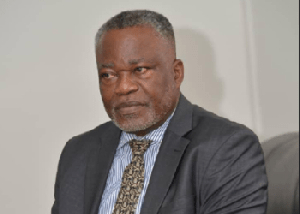
Colonel Festus B. Aboagye (Retired), a renowned security analyst, has expressed concern about former President Nana Addo Dankwa Akufo-Addo's decision to elevate a number of military officers to higher positions, including Ghana's Chief of Defence Staff (CDS) Thomas Oppong-Peprah to a 4-Star General, shortly before end of term in January 2025.
Discussions over the necessity of the promotions and their effects on Ghana's military performance have been triggered by the policy brief "Counting Stars—The Paradox of Sporadic Military Rank Inflation In Ghana's Democracy," which was just released.
"When symbols outweigh substance, authority loses its foundation" was the subtitle of the brief in which Col. Aboagye criticized the promotions' timing and rationale, claiming that they were out of step with Ghana's contemporary defense reality.
With Ghana's military strength at about 30,000 soldiers (ranked 113th in the world), a meager defense budget of US$300 million (down 5.4% from 2023), and unfunded plans for critical operational units, he said, "these high-level promotions appear disconnected from institutional needs and current security challenges."
According to the research, despite the military's comparatively moderate expansion in size and budget over the past 20 years, the number of generals in the Ghanaian Armed Forces has significantly increased. Between 2004 and 2024, the force strength increased just little, from slightly over 20,000 to less than 30,000 personnel, but the number of General Officer positions more than doubled, from 56 to 125.
Col. Aboagye called this tendency unhelpful, saying, "The number of generals over the past 20 years seems to be inversely proportional to military capability—more stars in command, less capacity to shine on the battlefield."
Also criticized in the policy brief is the promotion process's absence of parliamentary scrutiny. The Defense Minister, Col. Aboagye, reported this to the Defense and Interior Committee during a hearing on the budget, without obtaining the necessary parliamentary approval. He highlighted Ghana's history of military political interventions and said, "This circumvention of democratic processes raises critical questions about civil-military relations and democratic oversight."
Although the promotions might have been meant to improve Ghana's military reputation abroad, Col. Aboagye cautioned that without matching expenditures on military equipment and capabilities, they run the risk of compromising operational efficacy and professionalism. Ghana's intentions to expand its military by adding new infantry brigades, combat support formations, and special operations units between 2015 and 2024 are still mostly unfulfilled, he noted.
The policy brief urges immediate changes to match military promotions to the defense requirements of the country. The paper suggests that it is crucial to establish explicit standards for promotions that are based on operational requirements, force structure, and available resources. Additionally, it recommends putting money into real fighting capabilities rather than ceremonial rank inflation.
The revelations in Col. Aboagye’s analysis have reignited public discourse on the balance between symbolism and substance in Ghana’s military leadership. As the nation continues to grapple with evolving security challenges, many stakeholders are urging policymakers to reconsider the relationship between rank, resources, and readiness in the Ghana Armed Forces.